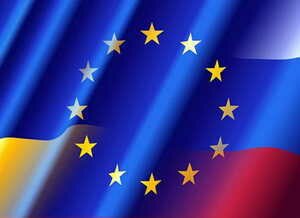
In recent months, despite the Kremlin's attempts to provoke growth of contradictions within the European Union and to activate difficult political processes in the EU Member States (as evidenced by the recent regional elections in France), the main external and internal political efforts of institutions and leading Member States of the EU are aimed at preventing threats and challenges that have arisen due to Russia's increased destructive activity at the European direction and Russian aggression against Ukraine.
In these circumstances, the European institutions have set the following main tasks for the nearest and medium term future:
- overcoming the tendency regarding deconsolidation of the European Union, caused by different attitudes of member countries to the development of relations with the Russian Federation;
- acceleration, taking into account the Russian factor, of formation of its security and defense policy;
- revision before the end of this year of the European Neighborhood Policy and, therefore, correction of relations with member countries of the EU Initiative “Eastern Partnership”;
- realization of the idea of a common energy market of the European Union;
- taking measures to prevent and counteract terrorism;
- strengthening the information policy against the background of the Russia's propaganda's powerful influence on citizens of the EU Member States and countries-neighbors of the European Union.
According to European experts, fulfillment of such tasks will become more complicated due to the increased Russian pressure on the EU to stop/not spread European sanctions against Russia, “to destruct the unity” of the European Union and “to drive the United States out of Europe”.
Overcoming trends for deconsolidation of the EU Member States
First of all, we mean here the steps being taken by Russia to further deepen the contradictions within the EU by actually ignoring development of relations with the European Union at the level of its institutions. Instead, it will promote exclusively bilateral format of relations with individual member countries using the so-called “privileged partnership”, granting them certain economic preferences. Russia will also actively support anti-European parties and movements in France, Spain, Italy, Great Britain, Greece and other countries.
Besides, with the help of military activities (deployment of offensive weapons in Kaliningrad region and in the Crimea, military trainings near the borders of the EU Member States, and so on), the Russian side will try to influence the important decisions of the European Union regarding Ukraine, in particular relating to sanctions against the Russian Federation and giving Ukraine defensive lethal weapons.
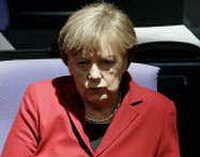 Thus, in European countries now there is no consensus on the issue of introduction of the EU Police Mission for the maintenance of peace and security in Ukraine. Most countries at the diplomatic level explain their position by the need to carefully study and discuss all the features of this operation (up to the need for a clear understanding of the mission's mandate, its deployment points, the algorithm of action, time frames). For example, Spain, Italy and Bulgaria point out that at this stage, a decision will not be taken, therefore it is too early to talk about the organization of formal procedures of the EU. Czech Republic and Hungary, based on the fact that the decision on this issue will be blocked at the level of the UN Security Council, propose to seek the consent of the other side involved in this problem, — of Russia.
Thus, in European countries now there is no consensus on the issue of introduction of the EU Police Mission for the maintenance of peace and security in Ukraine. Most countries at the diplomatic level explain their position by the need to carefully study and discuss all the features of this operation (up to the need for a clear understanding of the mission's mandate, its deployment points, the algorithm of action, time frames). For example, Spain, Italy and Bulgaria point out that at this stage, a decision will not be taken, therefore it is too early to talk about the organization of formal procedures of the EU. Czech Republic and Hungary, based on the fact that the decision on this issue will be blocked at the level of the UN Security Council, propose to seek the consent of the other side involved in this problem, — of Russia.
In its turn, the United Kingdom points out that a positive decision for the Ukrainian side may be affected by the position of individual EU Member States, in particular Germany and France, whose role in this issue will influence other countries' approaches. According to the estimates of the official Berlin and Paris, the decision to start the Mission of the EU in support of peace and security in Ukraine should be linked to the decision on strengthening the OSCE's functions and fulfillment of Minsk Agreements.
The idea of the supply of arms for the needs of the Armed Forces of Ukraine, is supported by Lithuania and Poland, but many countries-members are against this, pointing out that the situation in the East of Ukraine must be resolved exclusively by peaceful means, and believe that such weapons may exacerbate the confrontation and provoke an escalation of aggressive actions on the part of the Russian Federation.
Favorable trend for Ukraine in the European Union is a significant convergence of Poland and Romania's approaches to counteract Russia's current policy. These countries have activated coordination of their activity within the framework of the EU and NATO regarding relations with the RF, as well as on the issue of supporting the process of “Eastern Partnership” member-countries (first of all Moldova and Ukraine's joining the European Union). Today the official Bucharest, preserving the priority support of Moldova, at the EU level has a clear pro-Ukrainian position, and it can be viewed by Ukraine as one of consistent allies, at the level of the Baltic States and Poland.
 However, representatives of the European political elite say that Greece and Cyprus stick to the outright pro-Russian position. In particular, despite the support from the leadership of the European External Action Service and the Spanish side, these countries are getting, they managed to block and significantly delay at the level of the Political-Security Committee the decision to grant our state access to the data of the EU Satellite Centre, housed in Spain. In addition, Greece promises to actively use its right to veto in the discussion of the Ukrainian question at the EU level in order to obtain economic aid from the EU to recover its losses from the European sanctions against Russia.
However, representatives of the European political elite say that Greece and Cyprus stick to the outright pro-Russian position. In particular, despite the support from the leadership of the European External Action Service and the Spanish side, these countries are getting, they managed to block and significantly delay at the level of the Political-Security Committee the decision to grant our state access to the data of the EU Satellite Centre, housed in Spain. In addition, Greece promises to actively use its right to veto in the discussion of the Ukrainian question at the EU level in order to obtain economic aid from the EU to recover its losses from the European sanctions against Russia.
So, Russia's presence and activity in Europe, as well as the principle of consensus in decision-making at the level of the institutions of the European Union, allowing Member States to have a significant influence on the development of a common position on certain aspects of the Ukrainian question, can create in the EU some pro-Russian group of countries, which would undermine consolidating policy of Germany and France (as leaders of the European Union), to prevent the successful implementation of the European Eastern policy (including in regard to Ukraine) and to actively oppose the pro-American pool of the EU Member States (UK, Sweden, Poland, Romania and the Baltic States). Today such potential Russians' allies can be considered Greece, Cyprus, Hungary, Austria, Italy, Spain and Slovakia, actively opposing sanctions pressure on Russia.
Features of the European Neighborhood Policy
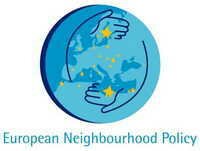 Lately, in the EU institutions and Member States of the Union have got intensified practical measures aimed at revision of the European Neighborhood Policy (ENP), including the preparation of the Riga Summit “Eastern Partnership”. Aware of the ineffectiveness of the ENP projects, the European Commission is developing a new concept (“ENP Communication”) of relations with neighboring countries, at this suggesting that consultations with partner countries will be held till the end of June (by the beginning of Luxembourg's heading the EU Council the document will be presented as the “Green Card of the Revised Neighborhood Policy”), the final document on the revision of the ENP will be published in late October-early November 2015.
Lately, in the EU institutions and Member States of the Union have got intensified practical measures aimed at revision of the European Neighborhood Policy (ENP), including the preparation of the Riga Summit “Eastern Partnership”. Aware of the ineffectiveness of the ENP projects, the European Commission is developing a new concept (“ENP Communication”) of relations with neighboring countries, at this suggesting that consultations with partner countries will be held till the end of June (by the beginning of Luxembourg's heading the EU Council the document will be presented as the “Green Card of the Revised Neighborhood Policy”), the final document on the revision of the ENP will be published in late October-early November 2015.
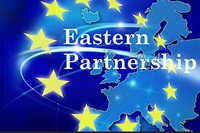 According to our experts, the nature of the debate in the EU about the neighborhood policy indicates that in it will be changed the priority in favor of the Eastern Dimension (EP) compared to the Southern dimension (“Union for the Mediterranean”), currently receiving 2/3 of the EU's financial assistance.
According to our experts, the nature of the debate in the EU about the neighborhood policy indicates that in it will be changed the priority in favor of the Eastern Dimension (EP) compared to the Southern dimension (“Union for the Mediterranean”), currently receiving 2/3 of the EU's financial assistance.
Besides, there is a high probability that in the process of preparation of the final documents of the Riga Summit of the EU Initiative “Eastern Partnership” (May 21-22) may change the initial paradigm of the EP (providing for economic integration of Eastern neighbors by creating associations, opening their markets to European goods and economic and impossibility of economic and political joining the Customs Union and other structures created under Russia's auspices), because conflicts with Russia are pushing the European Union to actual creation of the so-called “buffer zone” between the EU and Russia with certain rules of the game on the field.
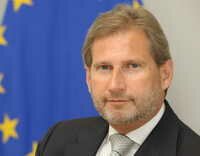 Indirect confirmation of such forecasts can serve the debate at the meeting of the European Parliament's Committee on Foreign Affairs March 9, 2015, during which members generally agreed that the EU neighborhood policy did not take into account interests of other countries (neighboring countries' neighbors), that is why it will be updated. At this, the present at the meeting European Commissioner for Enlargement and Neighborhood Policy Johannes Hahn, drawing attention to the need of the EU's support to Ukraine, said that the reaction of the neighboring countries should be taken into consideration. On the sidelines of the meeting they noted that Russia's reaction to the Association Agreement with Ukraine was predictable, but the degree of rigidity of its position in relation to our country for the EU was unexpected. So, the new concept of the EU's neighborhood will continue taking into consideration the interests of the Russian Federation.
Indirect confirmation of such forecasts can serve the debate at the meeting of the European Parliament's Committee on Foreign Affairs March 9, 2015, during which members generally agreed that the EU neighborhood policy did not take into account interests of other countries (neighboring countries' neighbors), that is why it will be updated. At this, the present at the meeting European Commissioner for Enlargement and Neighborhood Policy Johannes Hahn, drawing attention to the need of the EU's support to Ukraine, said that the reaction of the neighboring countries should be taken into consideration. On the sidelines of the meeting they noted that Russia's reaction to the Association Agreement with Ukraine was predictable, but the degree of rigidity of its position in relation to our country for the EU was unexpected. So, the new concept of the EU's neighborhood will continue taking into consideration the interests of the Russian Federation.
Today, in preparation for the Riga Summit, the EU Member States have reached a consensus only in the fact that at such an event must be confirmed the EU's political commitments before the EP member-countries; “Eastern Partnership” should be formed on the basis of an individual approach to each partner-country; participating countries to implement reforms in accordance with the Association Agreements, should receive more tangible assistance. However, the questions of partner-countries' getting the prospect of membership in the EU or transition to a visa-free regime with Ukraine and Georgia remain controversial, and the possibility of consensus on them — is unlikely.
In particular, some EU Member States (notably Germany and France) show extremely cautious attitude to Eastern Partner countries' prospect of joining the EU. The essence of this approach is that the accession to the European Union should not be defined as the ultimate goal of cooperation with Eastern partners. In this context, it is noted that from the Riga Summit we should expect only realistic results, taking into account, inter alia, disturbing development of the situation around Ukraine and the Russian side's not fulfilling Minsk Agreements.
At this, Poland believes that within the framework of the European perspective of the member countries of “Eastern Partnership”, acceptable to all EU Member States can be the formula, developed on the basis of the conclusions of the European Council on Foreign Relations (of 2014), according to which the Agreement about Association/deep and comprehensive free trade area is not the final goal of cooperation of Eastern Partners with the European Union.
Realization of the idea of a single EU energy market
 In recent years, the EU has stepped up significantly the development of measures to reduce energy dependence on Russia. To this end, the EU began to implement the idea to create a “unified energy union”. In particular, March 19, 2015 the European Council approved the Strategy of the EU Energy Union, during the development of which one of the key subjects to discussion was the proposal to strengthen Brussels' control over the conclusion of contracts between EU Member States and gas exporters.
In recent years, the EU has stepped up significantly the development of measures to reduce energy dependence on Russia. To this end, the EU began to implement the idea to create a “unified energy union”. In particular, March 19, 2015 the European Council approved the Strategy of the EU Energy Union, during the development of which one of the key subjects to discussion was the proposal to strengthen Brussels' control over the conclusion of contracts between EU Member States and gas exporters.
Now the EU supervisory authorities receive information on harmonization of agreements after they have been formally signed, which previously enabled the EU countries concerned to conceal individual items of the contract. Within the new energy union, the following agreements will be more transparent thanks to the consolidation of Brussels' right to control the whole process of negotiations on the signing of energy agreements not only by EU Member States, but also by commercial companies. Therefore, for example, confidential talks between “Gazprom” and European concerns will be impossible. Of course, the most critically these provisions are perceived by the leadership of a number of South-Eastern European countries (Hungary, Bulgaria, Slovakia, and others) that seek to enhance cooperation with Russia in the energy sector.
In general, the EU believes that gradual implementation of such principles of work will provide an opportunity in the near future to significantly reduce demand in the EU for energy imports. This will limit the mechanisms of Russia's influence on energy stability and solving within the EU of political issues, including on the situation in Ukraine. Besides, implementation of this project creates preconditions for diversification of energy imports by Ukraine in case of its integration into the “European energy network”.
Directions of strengthening of the Common Security and Defense Policy
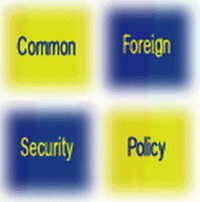 Due to deteriorating of the security situation in the EU and ongoing Russian aggression against Ukraine, the European Union is taking the necessary measures and is actively discussing the forms of strengthening of the Common Security and Defense Policy (CSDP). In particular, such a discussion took place at the Security Forum of the European Union (January 20), the European Parliament's meeting (March 11) and at the meeting of the European Council (19-20 March).
Due to deteriorating of the security situation in the EU and ongoing Russian aggression against Ukraine, the European Union is taking the necessary measures and is actively discussing the forms of strengthening of the Common Security and Defense Policy (CSDP). In particular, such a discussion took place at the Security Forum of the European Union (January 20), the European Parliament's meeting (March 11) and at the meeting of the European Council (19-20 March).
Today the EU representatives point out the unanimity of member countries of the EU and the USA in their perception of Russia's aggressive actions against Ukraine and draw attention to the fact that complicated relations with the official Moscow have already led to a substantial increase in the military presence of NATO forces in the Eastern European Member States. At the same time they believe that this situation forces to conduct additional trainings with participation of the armed forces of the Alliance in the Baltic region, as well as to use in the EU member states methods and measures to counteract the so-called “hybrid war”. All this should first of all prevent realization by Russia in Baltic states of the scenario similar to the Ukrainian one.
At the EU level, they point out that it is advisable to create a new strategy (conception) of the European Union in the sphere of defense. In its development should be actively involved eastern EU members. They also believe that in the new EU security strategy, special place should be given to Ukraine (taking into consideration the fact that the official Kiev has given up the non-aligned status).
Besides, during the summit of “Eastern Partnership” in Riga will be discussed the characteristics of the EU's further cooperation with partner countries within the framework of foreign and security policy. An example of such cooperation is Georgia's participation in the EU Mission in the Central African Republic, which is carried out within the framework of the Common Security and Defense Policy of the EU, and the EU Mission to assist on the Ukrainian-Moldovan border and the EU Monitoring Mission in Georgia. Promising directions of such cooperation are as follows: to attract Eastern partners to missions and operations of the Common Security and Defense Policy, the improved exchange of information among the participating countries of the “Eastern Partnership” and member states institutions of the EU, as well as providing consulting assistance in reforming the security sector in partner countries.
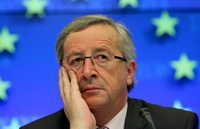 Against the background of the European security debate, a special resonance got the President of the European Commission J.-C. Juncker's idea to create a “common European army,” with which “Europe will be able to respond to threats to security of both, member-states and neighboring the EU countries, and to let Russia understand that the EU is ready to seriously defend its values”. Ignoring the fact that this idea has caused a mixed reaction in the EU Member States (from direct support to non-perception), it will be discussed at the next EU Summit in June.
Against the background of the European security debate, a special resonance got the President of the European Commission J.-C. Juncker's idea to create a “common European army,” with which “Europe will be able to respond to threats to security of both, member-states and neighboring the EU countries, and to let Russia understand that the EU is ready to seriously defend its values”. Ignoring the fact that this idea has caused a mixed reaction in the EU Member States (from direct support to non-perception), it will be discussed at the next EU Summit in June.
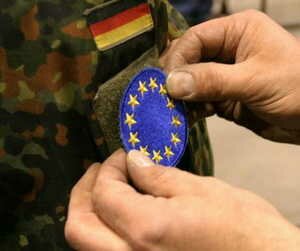 At the same time, in the context of the Ukrainian issue, the official Brussels is rather skeptical about the idea of a possible peacekeeping operation or creation of a civilian mission under the EU CSDP in Ukraine in order to promote and ensure the monitoring of the implementation of Minsk arrangements. This position is explained in Brussels, in the first place, by the fact that to carry out the EU Police Mission tasks is enough the already existing mandate of the Advisory EU Mission to reform the sector of civil security of Ukraine, which can be supplemented at the initiative of the Ukrainian side, and after consultations with the EU.
At the same time, in the context of the Ukrainian issue, the official Brussels is rather skeptical about the idea of a possible peacekeeping operation or creation of a civilian mission under the EU CSDP in Ukraine in order to promote and ensure the monitoring of the implementation of Minsk arrangements. This position is explained in Brussels, in the first place, by the fact that to carry out the EU Police Mission tasks is enough the already existing mandate of the Advisory EU Mission to reform the sector of civil security of Ukraine, which can be supplemented at the initiative of the Ukrainian side, and after consultations with the EU.
Besides, political and expert circles in the institutions and the EU Member States are drawing attention to a number of factors, significantly complicating the prospects of realization of the idea of a peacekeeping operation, in particular:
- absence of UN Security Council's resolution that hinders the process of seeking consensus within the EU in favor of the operation/mission;
- “Special” position of Greece, which does not allow to reach a consensual agreement of all Member States of the EU as a mandatory prerequisite for the practical implementation of the initiative and the approval of the decision by the EU Council;
- organization of a military operation/EU mission will require the use of the long-term and “profitable” for skeptics-countries of the so-called Athens mechanism, which can be long-term, will complicate internal debate at the level of EU Member States and will allow skeptics to raise the issue of the need to reduce costs and of unwillingness to allocate funds for the settlement of the situation in Ukraine;
- fear that Russia misinterprets such a decision and will accept it as final evidence of the EU's transition to a direct military confrontation with Russia.
The EU's policy to counteract Russian propaganda
 Recently, at the level of institutions and EU Member States, has been actively discussed the idea of implementing a coherent policy to counteract Russian propaganda, in order to improve the level of public resistance to the disinformation and propaganda in the EU, in its Eastern partner-countries, as well as in Russia itself (details about the myths distributed by the Kremlin were analyzed in the analytical article of our Center on March 16 this year, “Counteracting Russian Propaganda: about Messages that Putin's Apologists Are Trying to Impose on the World”).
Recently, at the level of institutions and EU Member States, has been actively discussed the idea of implementing a coherent policy to counteract Russian propaganda, in order to improve the level of public resistance to the disinformation and propaganda in the EU, in its Eastern partner-countries, as well as in Russia itself (details about the myths distributed by the Kremlin were analyzed in the analytical article of our Center on March 16 this year, “Counteracting Russian Propaganda: about Messages that Putin's Apologists Are Trying to Impose on the World”).
Common approaches of the European community include preparations by the European External Action Service of the Action Plan for 2015-2016 with the previous provision of recommendations for the implementation of counterpropaganda steps both in the member states of the European Union and in the countries-participants of the EU initiative “Eastern Partnership” and the Russian Federation, creation of Web platform for open announcement of cases of fraud/ manipulations.
As part of the preparatory activities, the following measures are expected:
- discussion of this issue by high-level officials of the EU and enhanced cooperation with NATO;
- financing of appropriate training programs;
- support to international and state Russian-speaking media initiatives;
- facilitating the exchange of television productions of the EU countries in order to provide a competitive alternative to Russian products spread in the European television market;
- assisting governments of partner-countries in the region and creation of a regional online platform to support journalists.
To establish a strategic and effective channel of communication with the local Russian-speaking population will be provided the possibility of using technical means to receive satellite television in Russia without the use of a satellite dish.
It is also believed that it is necessary to strengthen the public diplomacy and policy in order to expand the influence on the population of Russia, which will include an active correction of false statements about the EU, the spread of objective information about the European Union, its position on certain issues and its programs and so on. This will give the opportunity to have access to a specific target audience, which is part of the Russian civil society as well as to increase the budget of the European instrument for Democracy and Human Rights.
Conclusions
Taking into consideration these trends of the domestic political life and foreign policy of the EU member countries, the main task for the Ukrainian side should be maximum participation of our country in EU projects (in the spheres of security and defense, energy, research, science and innovations/like the EU program “Horizon 2020”/), in the development of systems of neighborhood and counteracting the Russian propaganda, as well as in initiatives to neutralize Russia's potential allies in the European Union.
We and our European partners should be prepared for the fact that the Kremlin will not stint on resources. It will try to manipulate the principle of consensus in decision-making in the EU, will influence positions of individual EU Member States (pressure, blackmail, favorable economic and energy offers). It will also oppose the post-Soviet countries' full participation in European projects, considering them an exclusive zone of Russian interests and major potential resource for creation of the “Russian world”.

